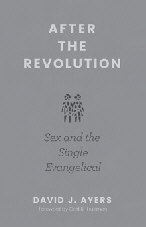Review Of "After The Revolution" -- By: Samuel D. James
Journal: Eikon
Volume: EIKON 06:1 (Spring 2024)
Article: Review Of "After The Revolution"
Author: Samuel D. James
Eikon 6.1 (Spring 2024) p. 132
Review Of After The Revolution
Samuel D. James serves as a developmental and acquisitions editor at Crossway. He is the author of Digital Liturgies: Rediscovering Christian Wisdom in an Online Age (Crossway, 2023).

David J. Ayers. After the Revolution: Sex and the Single Evangelical. Bellingham, Washington: Lexham Press, 2022.
Oliver Perry famously wrote to William Henry Harrison, “We have met the enemy, and they are ours.” This line has become a proverb for the sober moments when the difficulties and problems we think are caused by others are actually traced back to us. It’s an aphorism that’s appropriate for what David J. Ayers lays bare in After the Revolution: Sex and the Single Evangelical, a meticulously researched confrontation with the sexual habits of professing evangelical Christians.
After the Revolution is not a pleasant read. It may, in fact, be one of the most discouraging and uncomfortable books you have read in a while. The data Ayers presents is a straightforward story of moral compromise, thin discipleship, and a potentially disastrous future. Ayers couples this research
Eikon 6.1 (Spring 2024) p. 133
with reflection that is simple and unsparing, but not hopeless. If After the Revolution comes up short as a truly transformational work, it shines an important light on the state of conservative Protestantism today.
Ayers’s book essentially poses three questions: What is the biblical teaching on sexuality? How do the sexual habits of evangelical Christians compare with this teaching? And what is the long-term outlook for a Christian culture that gets this wrong? The first question yields (thankfully!) no surprises, as Ayers offers a traditional, exegetically responsible summary of the Bible’s sexual ethics. Culturally, Ayers writes a concise and helpful summary of the social transformation of sexual mores, arguing that Western society has migrated from “an ethic of covenant to an ethic of consent.” But the major contribution of After the Revolution is the use of data from the General Social Survey (GSS), National Survey of Family Growth (NSFG), and others, to assemble a reliable narrative of how evangelical Christians in Western society are living compared to the mainstream.
The results are unequivocal: A significant percentage of professing Christians in the United States express either uncertainty, ambivalence, or outright approval of sex outside marriage. A solid 35% of evangelical men and women say that sex between unmarried adults is “not wrong at all” (78). Evangelical habits...
Click here to subscribe
